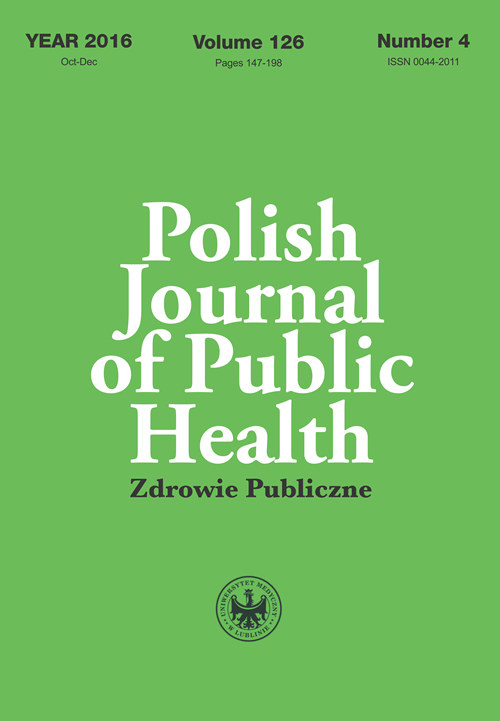Selected determinants of strategies to cope with the disease among women treated for gynecological cancer
DOI:
https://doi.org/10.1515/pjph-2016-0033Keywords:
gynecological cancer, coping strategiesAbstract
Introduction. The cancer of the reproductive organ, due to its specificity, is an extremely difficult situation for a woman.
Aim. The aim of the study was to answer the question what are the determinants of strategies to cope with the disease among women treated for cancer of the reproductive organ.
Material and methods. The study included 102 women treated for gynecological cancer. To assess coping strategies with disease, denoting adaptation to cancer, a Mini-Mac standardized scale of the Mental Adjustment to Cancer Diseases and the own construction questionnaire were used. Statistical analysis was performed using Chi² test, Mann-Whitney U test, W. Shapiro-Wilk, Kruskal-Wallis tests.
Results. Research shows that most respondents coped with the disease using the strategy: the fighting spirit (FS), and positive reevaluation (PR), but to a lesser degree they applied preoccupation with anxiety (PwA) and helplessness – hopelessness strategy (HH).
Conclusions.
- Most of the women fighting against cancer used constructive strategies, while the remaining part – the destructive ones. Choosing the type is determined by factors like the duration of the disease, the incidence of complications during treatment, subjective evaluation of how to improve the health status and satisfaction with treatment or length of hospital stay.
- Strategies of mental adaptation significantly affect the course of treatment. The use of absorbing anxiety causes significantly more women not to feel the improvement of health and hospitalization for them is a traumatic experience. In contrast, a form of helplessness – hopelessness is associated with low satisfaction with treatment, and lack of improvement in subjective health. People who use fighting spirit were significantly more satisfied with the results of treatment.
References
1. Booth K, Beaver K, Kitchener H, et al. Women’s experiences of information, psychological distress and worry after treatment for gynaecological cancer. Patient Edu Couns. 2005;56:225-32.
2. Gonçalves V, Jayson G, Tarrier N. A longitudinal investigation of psychological morbidity in patients with ovarian cancer. Br J Cancer. 2008;99:1794-801. [Web of Science] [Crossref]
3. Jacobsen PB, Donovan KA, Vadaparampil ST, Small BJ. Systematic Review and meta-analysis of psychological and activity-based interventions for cancer-related fatigue. Health Psychol. 2007;26:660-7. [Crossref] [Web of Science]
4. Juczyński Z. Narzędzia Pomiaru w Promocji i Psychologii Zdrowia. Warszawa: Pracownia Testów Psychologicznych Polskiego Towarzystwa Psychologicznego; 2001. p. 168-83.
5. Hans-Wytrychowska A, Drabik-Danis E, Kurpas D. Człowiek w przewlekłym stresie – jak pacjenci radzą sobie z chorobą przewlekłą. Fam Med Prim Care Rev. 2010;12:917-1119.
6. Kozaka J. Radzenie sobie ze stresem choroby – współczesne koncepcje teoretyczne. Psychoonkol. 2010;2:60-9.
7. Kosowicz M, Wysocka-Bobryk T. Rehabilitacja psychiczna pacjentek z nowotworem narządów rodnych. Ginekol Onkol. 2009;7:62-3.
8. Malicka I, Szczepańska J, Anioł K, et al. Zaburzenia nastroju i strategie przystosowania do choroby u kobiet leczonych operacyjnie z powodu nowotworu piersi i narządów rodnych. Współcz Onkol. 2009;13:41-6.
9. Kot J, Kaczor K, Kocur J. Poczucie umiejscowienia kontroli oraz nadzieja podstawowa jako cechy korelujące z psychicznym przystosowaniem do choroby nowotworowej u kobiet z rakiem piersi – doniesienie wstępne. Psychiatr Psychol Klin. 2008;8:155-63.
10. Szwat B, Słupski W, Krzyżanowski D. Sposoby radzenia sobie z chorobą nowotworową a poczucie depresji i nasilenie bólu u chorych objętych opieką paliatywną. Pielęg Zdr Publ. 2011;1:34-5.
11. Szczepańska-Gieracha J, Malicka I, Rymaszewska J, Woźniewski M. Przystosowanie psychologiczne kobiet bezpośrednio po operacji onkologicznej i po zakończeniu leczenia. Współcz Onkol. 2010;14:403-10.
12. Mehnert A, Koch U, Schulz H, et al. Prevalence of mental disorders, psychosocial distress and need for psychosocial support in cancer patients – study protocol of an epidemiological multi-center study. BMC Psychiatry. 2012;12:70. [Crossref] [Web of Science]
13. Ogińska-Bulik N. Rola prężności psychicznej w przystosowaniu się kobiet do choroby nowotworowej. Psychoonkol. 2011;1:1-10.
14. O’Sullivan CK, Bowles KH, Sangchoon J, et al. Psychological distress during ovarian cancer treatment: improving quality by examining patient problems and advanced practice nursing interventions. Nurs Res Pract. 2011;3467559:259.
Downloads
Published
Issue
Section
License
Copyright (c) 2017 Polish Journal of Public Health

This work is licensed under a Creative Commons Attribution-NonCommercial-NoDerivatives 3.0 Unported License.


